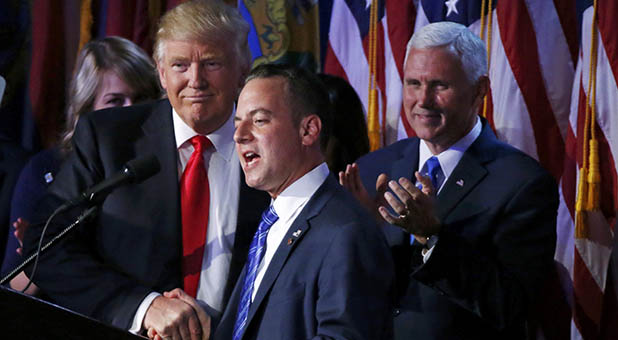Trust but Verify: Will Reince Priebus Be a Repeat of James Baker?
The selection of establishment Republican Reince Priebus, the current chairman of the Republican National Committee, as White House Chief of Staff, brings to mind the choice made by President Ronald Reagan when his revolution swept him into the presidency.
President-elect Reagan chose establishment Republican James Baker III as his White House chief of staff and nearly killed the Reagan Revolution in the process.
Baker was not a fan of many of Reagan’s conservative supporters, and if the final candidates for a key position came down to a committed conservative and one of the names in George H.W. Bush’s Rolodex, chances were the conservative lost out.
Baker, who had been Vice President George H.W. Bush’s campaign manager during the primaries, was also not a fan of Reaganism, especially the supply side economics and tax cuts that would power Reagan’s economic growth plan.
As my friend Dr. Lee Edwards observed in his book, The Conservative Revolution: The Movement that Remade America, Baker persuaded Reagan to accept the Tax Equity and Fiscal Responsibility Act of 1982 (TEFRA), which turned out to be the great tax increase of 1982—$98 billion over the next three years.
That was too much for 89 House Republicans (including second-term congressman Newt Gingrich of Georgia) or for prominent conservative organizations, such as the Conservative Caucus, headed by my late friend Howard Phillips, the American Conservative Union and even the establishment U.S. Chamber of Commerce, which all opposed the measure.
Despite the conservative opposition Baker assured President Reagan that Congress would approve three dollars in spending cuts for every dollar of tax increase.
Baker and establishment Republican leaders in Congress urged Reagan to make the deal with the Democrats “to support a limited loophole-closing tax increase to raise more than $98.3 billion over three years in return for their agreement to cut spending by $280 billion during the same period.”
Congress later reneged on the deal, and Reagan wrote ruefully in his biography that it was one of the greatest mistakes of his presidency because “we never got those cuts.”
As I observed at the time, regardless of Reagan’s successful battles to reduce income tax rates, the average American’s total tax payments had actually gone up in Reagan’s second year if you included increases in social security withholding.
And the spending “cuts” championed by White House Chief of Staff James Baker III were not absolute reductions in spending, they were merely reductions in the rate of increase.
As another star of the New Right, my late friend Terry Dolan, head of the National Conservative Political Action Committee (NCPAC) said of the influence of Baker, Budget Director David Stockman and other moderates President Reagan brought into important policy positions, “We constantly hear nonsense about how conservatives are running everything. If that were true, we wouldn’t have the biggest deficits in history.”
Personnel is policy, as the misadventures of President Reagan’s moderate advisers, such as White House Chief of Staff James Baker III, clearly demonstrated.
So this being known to influential members of Donald Trump’s team and family, why would President-elect Trump appoint an establishment Republican like Reince Priebus as his White House Chief of Staff?
Priebus and Wisconsin Governor Scott Walker remade the Republican Party of Wisconsin, building it into an effective organization that helped push the state, unexpectedly, into the win column for Donald Trump, but that’s not the reason Priebus was chosen White House Chief of Staff.
One reason and one reason only makes sense: Speaker of the House Paul Ryan.
Speaker Paul Ryan is also from Wisconsin and Priebus and Ryan are known to be close. Ryan has been an outspoken critic of President-elect Trump and from our perspective did almost anything he could to sink Trump’s campaign for president, short of actively campaigning against him as Ohio Governor John Kasich and the Bush family did.
Hiring Reince Priebus to sell Donald Trump’s policies to Speaker Ryan and other reluctant establishment Republicans would make sense to a businessman like Donald Trump, used to hiring expertise, employing people to accomplish a specific narrow task.
The problem is that politics, particularly among Washington’s inside elite, isn’t like business; it’s all about influence, and the flow of influence goes both ways.
The conservative populists who powered Donald Trump’s victory recognize that the flow of influence will certainly be stronger coming from Speaker Ryan through Priebus to the White House than it will be flowing from the White House through Priebus to Speaker Ryan.
Personnel is policy. Conservatives viewed President Reagan’s White House Chief of Staff, James Baker III, as a Fifth Column inside the White House and as one of the principle obstructions to implementing conservative policy. President-elect Trump would do well to recognize that Reince Priebus may occupy the same role in the Trump White House. {eoa}
Richard Viguerie transformed American politics in the 1960s and ’70s by pioneering the use of direct mail fundraising in the political and ideological spheres. He used computerized direct mail fundraising to help build the conservative movement, which then elected Ronald Reagan as the first conservative president of the modern era. As the “Funding Father of the conservative movement,” Viguerie motivated millions of Americans to participate in politics for the first time, greatly expanding the base of active citizenship. He is our era’s equivalent of Tom Paine, using a direct mail letter rather than a pamphlet to deliver his call to arms.
This article was originally published at conservativehq.com. Used with permission.














































